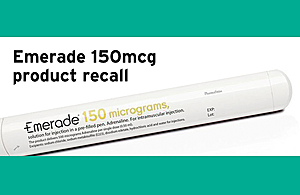Patients asked to return Emerade 150 micrograms adrenaline pens
Patients, or carers of patients, who carry Emerade 150 microgram auto-injector pens should return all in-date Emerade 150 micrograms auto-injectors to their local pharmacy once they have obtained a prescription for, and been supplied with, an alternative brand.

Image of Emerade 150mcg adrenaline injector
Patients, or carers of patients, who carry Emerade 150 microgram auto-injector pens should return all in-date Emerade 150 micrograms auto-injectors to their local pharmacy once they have obtained a prescription for, and been supplied with, an alternative brand. Emerade 150 microgram is used for the emergency treatment of severe, acute allergic reactions (anaphylaxis) in children.
-
only return your pen when you have received a replacement from your pharmacy which will be an alternative brand - either EpiPen or Jext.
-
ensure that you learn how to use the replacement pen that you have been supplied with, as each brand of pen is used in a different way. Ask your doctor, pharmacist or nurse for help with this. You will also find instructions on how to use your new pen inside the pack it is supplied in, along with details of the manufacturer’s website that also provides information, including videos, on how to use your new EpiPen or Jext adrenaline pen.
Recall action has been taken due to reports of difficulty in activating the Emerade pens, meaning a dose of adrenaline cannot be delivered. This defect also affects the 300 and 500 microgram strengths of Emerade adrenaline pens, which will be recalled when sufficient supplies of alternative brands (Epipen and Jext) are available. Patients who have in-date Emerade pens of these other strengths should keep these until the expiry date and should be reassured that available data shows the majority of the pens will still activate. Patients are reminded to follow existing advice to carry two pens with them at all times.
Exposure to high temperature may increase the risk of pen failure. Emerade pens should not be exposed to temperatures above 25°C, such as being placed near to a radiator or fire. If travelling to a hot climate, patients should visit their doctor to obtain a prescription for an alternative brand of adrenaline pen.
If an Emerade pen does need to be used, it should be pressed very firmly against the thigh. If this does not result in activation, the patient should immediately use their second pen. More detailed information for patients is available on the MHRA website. This includes images showing users what an activated pen looks like, compared to a non-activated pen.
ENDS
Note to editors
- The Medicines and Healthcare products Regulatory Agency (MHRA) and the Department of Health and Social Care (DHSC), have taken the action due to further evidence from the manufacturer, Bausch & Lomb UK Limited, alongside further reports from patients, of Emerade pens that have failed to activate.
- The MHRA issued a pharmacy-level recall of Emerade pens on 28 November 2019, and advice that can be shared with patients.
- Additional information for patients and carers who have Emerade pens can be found on pages 7, 8 and 9 of the MHRA’s Drug Alert.
- Emerade is a brand of adrenaline auto-injector (AAI) pen for the emergency treatment of anaphylaxis. It is available in three strengths of 150 microgram, 300 microgram, 500 microgram per dose.
- The Yellow Card scheme is MHRA’s system of monitoring the safety of medicines in the UK and it acts as an early warning system to identify new, and strengthen existing, safety information about medicines. Yellow Cards are used alongside other scientific safety information to help MHRA to take action, if necessary, to make changes to the warnings given to people taking a medicine or review the way the medicine is used to maximise benefit and minimise the risk to the patient.
- Medicines and Healthcare products Regulatory Agency is responsible for regulating all medicines and medical devices in the UK by ensuring they work and are acceptably safe. All our work is underpinned by robust and fact-based judgements to ensure that the benefits justify any risks.
- MHRA is a centre of the Medicines and Healthcare products Regulatory Agency which also includes the National Institute for Biological Standards and Control (NIBSC) and the Clinical Practice Research Datalink (CPRD). MHRA is an executive agency of the Department of Health and Social Care.